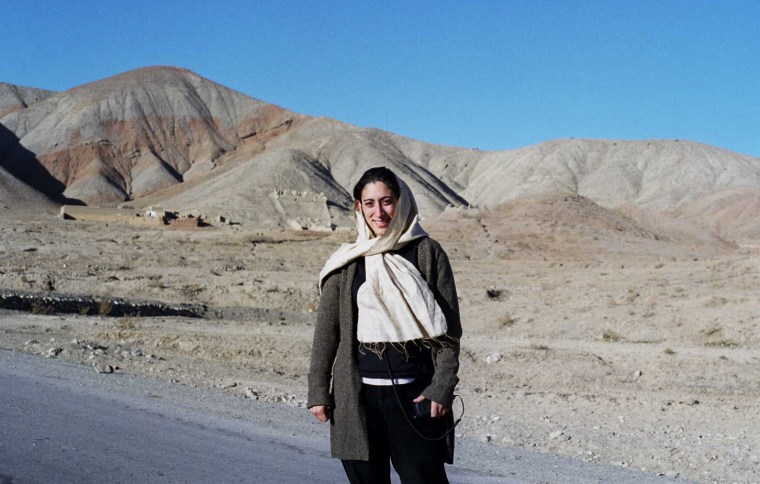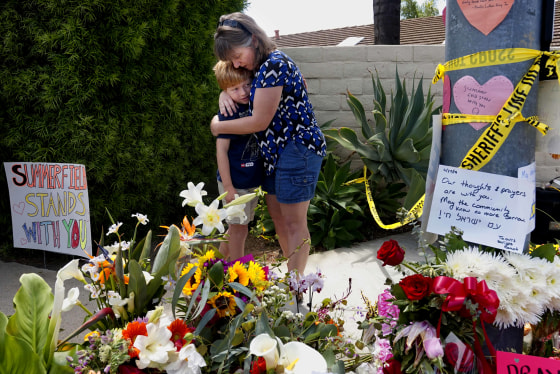I moved to Jerusalem 15 years ago this spring, drawn by a coveted position as a Middle East bureau chief and a chance to live life in one of the most exciting cities on Earth.
At the time, it was also a place where terrorism made you think twice about doing mundane things like meeting a friend in a cafe, going to a festival or a market — or really, anything that put you in the midst of a large crowd that could be an enticing target for a suicide bomber. When I made plans to eat out with friends or go on dates, the question wasn’t how well-reviewed the restaurant was, but how well-guarded.
Violent attacks against the Jewish community in the United States doubled last year.
Over time, Israel became my second home. I married and gave birth to my two children there. But covering another mini-war between Israel and Gaza, as I did in the summer of 2014, felt extraordinarily different with two toddlers in tow. Having adventures as a journalist was one thing — I had only myself to be responsible for. Though I cared deeply about Israelis and Palestinians, the brunt of the conflict was borne by people whom I didn’t know.
But over a summer of hurrying my kids into shelters during rocket attacks and attending the funeral of a teenage soldier whose mother was my son’s pre-school teacher, the realities of raising a family in Israel hit home. When I received an offer to join the faculty of a public university in Florida, I jumped at the opportunity to enter a new phase of life, reconnect with family and rediscover America for myself after nearly 20 years abroad, which included assignments in Iraq, Afghanistan, Turkey and Japan.

When you leave Israel for America, some Israelis view it with awe and envy, others with a sense of desertion. They often assume you’re choosing the easy life over a life of purpose. That America is a safe place for Jews — safer, oddly, than the nation-state that was set up to be the safe haven of the Jewish people — has long been a given.
But when for the second time in half a year, a hate-filled gunman walks into a synagogue and starts shooting, the givens may be starting to give. It’s not just the horror of an extremist stalking our houses of prayer, first in Pittsburgh and now in Poway, California, but an overall trend that’s getting harder to dismiss. Violent attacks against the Jewish community in the United States doubled last year, according to the Anti-Defamation League, while attacks including vandalism and harassment remained near record-high levels.
SIGN UP FOR THE THINK WEEKLY NEWSLETTER HERE
The America I returned to looks different from the one I left in other ways as well. Some things have progressed in the nearly two decades I was away — more Americans have health care, LGBT citizens can now legally marry — but other things seem to be moving backward. Hatred toward racial and religious minorities suddenly became socially acceptable, and calling it out is now the domain of the dreaded politically correct. Americans are being told that immigrants, particularly Muslims and Mexicans, are stealing jobs, bringing crime to America and opening a door to terrorism on our soil.
But from where I sit, it looks like the terrorism is growing from within.
Last Saturday I spent my morning in a synagogue much like the one in Poway — not the Conservative egalitarian one we belong to, but a Chabad “shul,” to use an old Yiddish term. That I was greeted by an armed guard who wanted to check my bag seemed like a formality. Hours later, I learned what had happened at a synagogue on the other side of the country and found myself thinking, again? The feeling that took over was disbelief rather than fear. I felt the urge to minimize the horror, whether to refuse to give a murderous hater center stage, or to deny that it could have been any of us in synagogue that day. This is random and this is marginal, right?
But if I’m honest I have to admit: It’s becoming more difficult to dismiss the rise of violent white supremacy and virulent anti-Semitism in America as the work of a lunatic fringe and lone wolves. Both the Poway and Pittsburgh attacks were committed by extremists encouraged by the ability to share racist screeds on sites like 8chan, and were buoyed by the new air of permissiveness about white nationalist views on full display at the “Unite the Right” rally in Charlottesville in August 2017 — an event never properly condemned by President Donald Trump.
I’ll admit that when I made a decision to return to America, the thought of taking my little family to live in a place where I wouldn’t have to think about cafes being blown up was attractive. I would not, as I did in Jerusalem, need to worry about the upkeep of the bomb shelter in my building nor the location of a safe room to get to in case of a rocket or missile attack. Friends poked fun at my decision to move to Florida, teasing me about golf courses and wondering if I, in my mid-40s, was headed into early retirement.
I want to believe that these events are random and far away, but the truth is they are closer and more connected than any of us care to admit.
But Florida, with multiple mass shootings that seem to put it at the heart of the American story, has dragged me into the kind of up-close encounters with terrorism I thought I’d left in the Middle East. I covered the Pulse Nightclub shooting in 2016, and last year, I covered the disaster down the road, the shooting at Marjory Stoneman Douglas High School in Parkland.
It’s difficult to keep telling my children, now seven and eight, that despite these events happening at schools near them and synagogues like ours, there’s nothing for them to worry about. I want to believe that these events are random and far away, but the truth is they are closer and more connected than any of us care to admit.
The feeling that the very place that should serve as one’s spiritual refuge is actually a target is an experience that’s already been felt by many in this nation — most recently by Muslims attending mosques and African Americans going to church. As Jews we’ve had our share of this hatred over the millennia, but seeing it follow us into our sanctuaries on American soil is something new.
I am concerned but not afraid. I feel resolved to keep forming alliances and build community within the interfaith organization I am part of and to share in the struggle against hatred and intolerance. I am privileged to have an opportunity to teach journalism, which exposes students to a wide variety of narratives and expands their worldviews far beyond their front doors.
America, despite the president’s recent pronouncement, is not full. It still needs immigrants from all walks of life to keep coming in search of the American dream. All of our families and faith traditions are part of that story. The America that welcomed my grandparents and great-grandparents and all the hard-working immigrants I know — from my Israeli-born husband to my students struggling to be the first in their families to earn a college degree — is the America I am proud to still call home.
